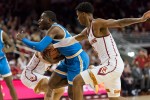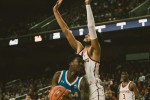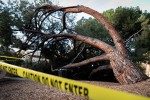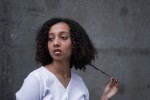The Bruins lost to the Trojans despite a 3-point deficit during halftime at the Galen Center.
Men’s basketball’s 3-point halftime deficit widens into 80-67 loss to USC
This post was updated Jan. 19 at 4:14 p.m.
Once again, the zone defense was impenetrable.
Not UCLA’s, against which USC made 16-of-30 field goal attempts in the second half and shot 46.9 percent overall.
The Bruins (10-8, 3-2 Pac-12) struggled again to generate open looks against a 2-3 zone defense, shooting under 40 percent from the field during the majority of their 80-67 loss to the Trojans (10-8, 3-2) on Saturday.
“In the first half, we got a lot of open looks, trusted one another as a team,” said sophomore guard Kris Wilkes. “Mentally, in the second half, it just wasn’t the same. In order to win games and beat them the next time we play them, we have to play a whole 40 minutes, trusting each other and scoring the ball.”
Even against no defense, UCLA’s shots clanked iron much more often than it glided through nylon and twine.
Coming into Saturday, the Bruins only shot 62 percent on free throws, but they only made four of 12 shots from the charity stripe against the Trojans.
Freshman center Moses Brown missed all six of his free throws and his first four shots from the floor, scoring a career-low two points. Sophomore guard Chris Smith missed all five of his shots from the field.
UCLA also turned the ball over 20 times, the third time in the last four games that it surpassed at least 20.
Sophomore guard Jaylen Hands led the Bruins with six turnovers.
“We’re still turning the ball over too much,” said interim coach Murry Bartow. “When you go on the road, you’ve got to play letter-perfect and we didn’t.”
Through five conference games, UCLA has recorded more assists than turnovers just once. On Saturday, it managed only 13 assists compared to USC’s 26.
“We were really moving it in the first half but in the second half, we just got real stagnant,” said redshirt junior guard Prince Ali. “That’s something that we’re going to have to figure out soon because we’re going to play a lot more teams who are just as talented or more talented (than USC).”
The Bruins briefly switched to a 1-3-1 zone defense in the first half, but it remained in the locker room following halftime as Bartow stuck with the 2-3 zone for the rest of the game.
After Ali tied the game at 36 with a 3-pointer in the opening minute of the second half, the Trojans went on a 27-6 run over the next nine minutes.
The defensive scheme wasn’t the problem.
“We probably would have gotten a few more stops (playing 1-3-1) but it wasn’t defense that was messing us up,” Wilkes said. “If we played with the same offense, I don’t think (a different defense) would have helped us out that much.”
Ali made three of his seven 3-point attempts, but his teammates combined to go 2-of-15. Ali and Hands both led the Bruins with 15 points each, and Wilkes added 13.
USC guard Jonah Mathews and forwards Bennie Boatwright and Nick Rakocevic combined for 58 points on 22-of-42 shooting.
The Trojans outshot the Bruins 41.4 percent to 22.7 percent on 3-pointers.
Men’s basketball tails USC at 36-33 after turnover-heavy first half
Before a single minute passed, sophomore guard Chris Smith fumbled a fast-break pass with no one within five feet of him.
Later in the first half, redshirt junior guard Prince Ali airballed a trail 3-pointer on another fast-break possession.
Yet despite a multitude of miscues, UCLA men’s basketball (10-7, 3-1 Pac-12) only trailed 36-33 to USC (9-8, 2-2) at halftime.
The Bruins and the Trojans combined for 20 turnovers in a first half marked by both teams racing downcourt, only to reverse halfway because of another change in possession.
UCLA particularly struggled to convert on its opponent’s turnovers. Sophomore guard Jaylen Hands nearly airballed a wing 3-pointer on a 2-on-1 fast break with four minutes remaining in the first half. As a team, the Bruins only shot 1-of-9 from behind the arc in the first half.
Sophomore guard Kris Wilkes led UCLA with 11 points, and Hands added 10.
Moses Brown struggled in his first taste of the crosstown rivalry. The freshman center missed both his field goal attempts and all four of his free throws, and sat on the bench for the final eight minutes of the period after picking up his second foul.
Large tree falls down in front of Ackerman Union
A tree fell outside the UCLA Store in Bruin Plaza on Friday afternoon, partially blocking part of Bruin Walk.
Nurit Katz, executive officer of Facilities Management, said the tree was reported at 4:11 p.m., but she was not sure exactly when the tree fell.
Katz added while Facilities Management has not yet assessed the tree, she thinks the tree likely fell because heavy rain throughout this week loosened the soil.
Jan Broese, a third-year political science student, said while he didn’t witness the tree falling personally, he saw many people gathered near the tree shortly after it fell.
“I was actually surprised the tree could fall,” Broese said.
Christine Sun, a UCLA alumna, said she was concerned about similar incidents happening in other areas of Westwood after seeing the fallen tree on Bruin Plaza.
“This makes me worried about the trees in front of the apartments because if something can happen in just an hour or so, I’m more worried about cars that could be underneath or students walking by,” she said. “People joke about it, but it’s also pretty scary to think about if you are under a tree that could fall on you.”
No injuries or damages to property were reported, and the tree will be removed by a grounds crew by the end of Saturday, Katz said.
Contributing reports by Hedy Wang, News editor
Gallery: Curls unlocked
This gallery features young women and their experiences of having naturally curly hair, including their shared struggles and perspectives on identity.
Week two: Gymnastics scores double 10s, student advisor position debated
This Week in the News serves as The Quad’s space for reflection on current events at and around UCLA. Every week, Daily Bruin staffers will analyze some of the most significant stories to keep readers up to speed.
It’s week two and students are beginning to get comfortable with their new classes. While it may still be the beginning of the quarter, a lot has happened to keep Bruins busy. From UC regent debates to Katelyn Ohashi’s perfect 10, here are the Quad’s picks for this week’s news.
Gymnastics surpasses the competition at Collegiate Challenge with two perfect 10s
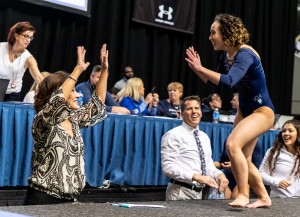
UCLA gymnastics took first place at the Collegiate Challenge in Anaheim, California, on Saturday night with a winning score of 197.700.
It was an impressive night for many members of UCLA’s gymnastics team, including senior Katelyn Ohashi, who scored a perfect 10 on her floor routine. Ohashi continued to perform well on the balance beam, scoring a 9.975.
Junior Kyla Ross continued the trend with another perfect 10 on the uneven bars followed by an 9.875 on the vault and a 9.925 on floor exercise. Ross tied her career high of 39.700 in the all-around competition.
Other noteworthy contributions came from freshman Margzetta Frazier, competing on vault for the first time this year with a score 9.825, followed by an almost flawless 9.925 score on the uneven bars. Sophomore Pauline Tratz achieved a 9.850 on vault and a 9.925 on floor exercise along with junior Gracie Kramer, Frazier and Ross.
UCLA gymnastics coach Valorie Kondos Field – or “Coach Val” – said the team’s attitude going into this meet contributed to its success.
The team will go head-to-head against Arizona State on Monday in Pauley Pavilion.
UC student leaders divided in opinion over whether to end student advisor position
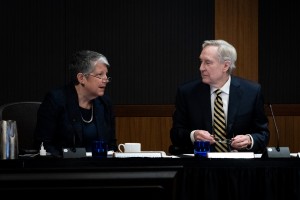
Disagreement among University of California student leaders continued in the debate over whether to end the student advisor position Sunday.
The student advisor position was created in 2016 in response to students’ wanting greater representation on the board. However, this position does not have voting power or the ability to attend closed meetings.
The UC Student Association President Caroline Siegel-Singh stood in favor of terminating the position, while leaders like Claire Fieldman, co-chair of the UC Council of Presidents and president of Undergraduate Students Association Council, and Michael Skiles, co-chair of the UC Council of Presidents and president of the Graduate Students Association, felt the position should continue.
Current student advisor Edward Huang agreed the position should remain, claiming the position has been successful in its goal to provide greater student representation. Rafi Sands, former student advisor, added the student advisor has helped with multiple initiatives, citing his involvement in launching the UC Advocacy Network student ambassador program and the creation of a database with the contact information for all student leaders who could help the regents with specific policies.
Despite these accomplishments, the UCSA was in support of terminating the position, claiming the regents should instead expand the roles of previously existing positions, such as Committee Observers and Student Advocate to the Regents, or StARs. Siegel-Singh also recommended the UCSA president should become a permanent StAR and another StAR position should be added to better represent student interests.
“The organization of the position, the real nuts and bolts of the position, doesn’t set up students to succeed in delivering the best feedback to the Board of Regents,” said Aidan Arasasingham, the director of legislative affairs in the USAC external vice president office.
Arasasingham added student advisors are asked to speak on issues that no one student has the knowledge or resources to explain. He argued having a broader set of positions to a greater number of students would provide greater student representation.
The regents’ most recent statement recommends extending the program until 2020 and attacking the program’s current problems. However, the UC Board of Regents voted Thursday to end the position after July. Instead, the board decided to add more Student Observer and StAR positions.
Faculty express concerns over lack of diversity in UCLA Health’s hiring process
Faculty members of UCLA Health raised concerns during a town hall over the lack of diversity in the search committee choosing the replacement of Peter Whybrow after his 20 years as the chair of psychiatry and biobehavioral sciences and director of the Semel Institute for Neuroscience and Human Behavior.
The faculty members questioned the lack of diversity on the committee, which is composed of 11 members – 10 of which were white and eight of which were men. Further, the faculty is unhappy with the proposal to split Whybrow’s role into two separate positions.
Worries that this lack of diversity may cause the committee to overlook qualified candidates from underrepresented communities in Los Angeles permeated the discussion. Eraka Bath, assistant professor of child and adolescent psychiatry, said this committee does not align with UCLA Health administration’s usual emphasis on equality and inclusion.
Despite these claims, the committee technically fits the guidelines set by the Office of Equity, Diversity and Inclusion with 25 percent of search committee members coming from diverse groups. However, women are included in the diversity quotient, something Bath disagrees with.
Further questions were raised regarding the separation of the roles of psychiatry chair from the director position. There are concerns that the separation may make it harder for the positions to serve the mental health needs of Los Angeles to the best of their abilities.
Stephen Marder, an attending psychiatrist at UCLA’s psychosis clinic, said he feels the separation would create issues within the psychiatry chair position as it would lack the necessary resources from the director position. However, Johnese Spisso, president of UCLA Health, reassured faculty that these two positions could work in partnership to fulfill the obligations of the larger community.
Faculty members felt they should be included in the discussion over Whybrow’s replacement. John Mazziotta, vice chancellor of UCLA Health Sciences and CEO of UCLA Health, expressed the board is open to continued deliberations and will continue searching until UCLA Health finds the right person for the job.
Sports Video: Week in Review 1/11-1/18
Daily Bruin Sports Video takes a look at what went on in UCLA Athletics this week.

